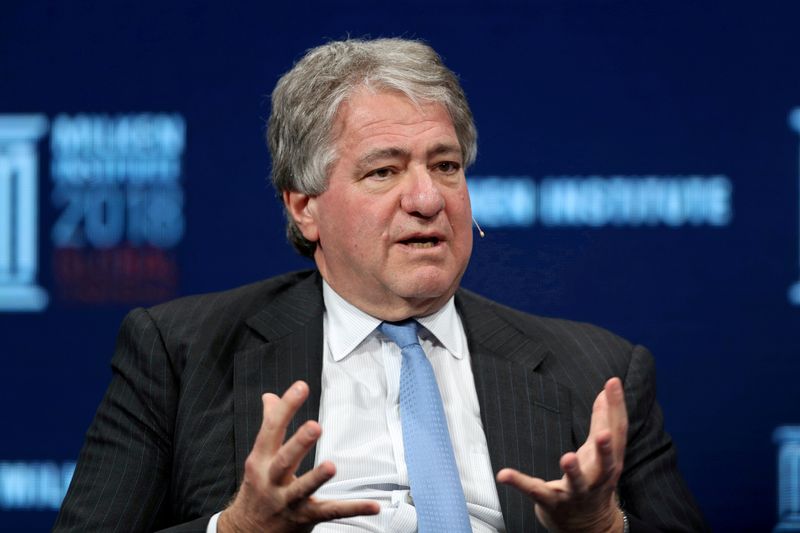By Chibuike Oguh and Noor Zainab Hussain
(Reuters) - Apollo Global Management (NYSE:APO) Inc co-founder Leon Black has left his executive positions at the private equity firm, a surprise move that caps a series of corporate governance changes triggered by a review of his ties to late financier and convicted sex offender Jeffrey Epstein.
Black, who co-founded Apollo 31 years ago, stepped down as the company's chairman, with Jay Clayton, former U.S. Securities and Exchange Commission chief, taking over as non-executive chairman, according to a statement on Monday.
Black, 69, had planned to retain his role as chairman after relinquishing his post as chief executive officer in January following an independent review by law firm Dechert, which revealed that he had paid Epstein $158 million for advice on tax and estate planning and related services between 2012 and 2017. The review had cleared Black of any wrongdoing.
Apollo's stock price rose 4.5% to close at $49.42 per share after Black's departure was announced.
"The relentless public attention and media scrutiny concerning my relationship with Jeffrey Epstein - even though the exhaustive Dechert report concluded there was no evidence of wrongdoing on my part — have taken a toll on my health and have caused me to wish to take some time away from the public spotlight that comes with my daily involvement with this great public company," Black said in a letter to Apollo's board of directors.
Epstein was found dead at age 66 in August 2019 in a Manhattan jail, while awaiting trial on sex trafficking charges for allegedly abusing dozens of underage girls in Manhattan and Florida from 2002 to 2005. New York City's chief medical examiner ruled the cause of death was suicide by hanging.
Apollo said on Monday that co-founder Marc Rowan will formally take over as CEO after being named as Black's successor in January. Two new independent directors, Richard Emerson (NYSE:EMR) and Kerry Murphy Healey, were also added to Apollo's board.
New York-based Apollo had appointed Clayton, 54, who was SEC chairman from May 2017 to December 2020, as lead independent director in February to improve corporate governance after the review.
"I think it was appropriate that once Black left as CEO he also leave as chairman," said Charles Elson, a corporate governance expert and finance professor at the University of Delaware. "If they wanted to remove affiliation, it wouldn't have made any sense if he remained as executive chairman overseeing the board."
On Monday, Citigroup (NYSE:C) analysts upgraded Apollo's rating to "Buy" from "Neutral," citing a sharp reduction in risks associated with investigations into Black's personal relationship with Epstein.
Black was subpoenaed last year by U.S. Virgin Islands Attorney General Denise George as part of a lawsuit against Epstein's estate seeking civil penalties and the forfeiture of assets including two private islands on which he allegedly raped and trafficked girls and young women.
Black has said he intends to cooperate with the inquiry as well as any other investigation.
Earlier this month, Apollo announced it would merge with Athene Holding (NYSE:ATH) Ltd in an $11 billion all-stock deal, bringing in-house an annuities provider that helped turn it into one of the world's largest corporate credit investors.
"In the last few months, not only did we announce a transformative merger with Athene, but also expect to report that our first-quarter earnings will exceed analyst consensus in all relevant measures," Black said in a statement on Monday.
"I thus view this as the ideal moment to step back and focus on my family, my wife Debra's and my health issues, and my many other interests," he added.

Black said he will remain Apollo's single largest shareholder and hopes to return to the company at some point.
